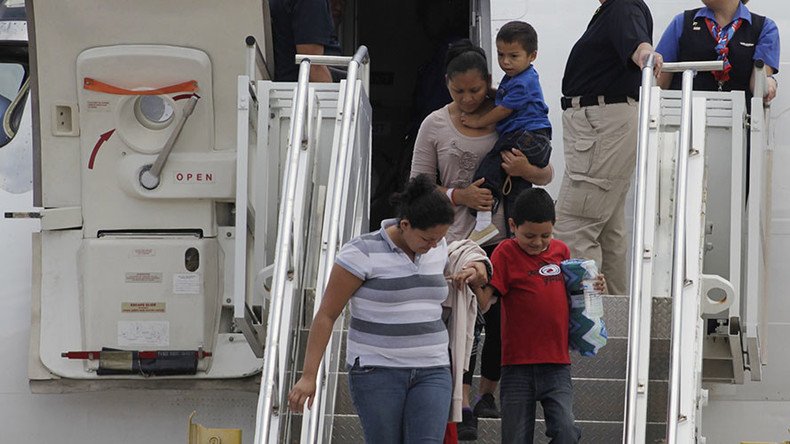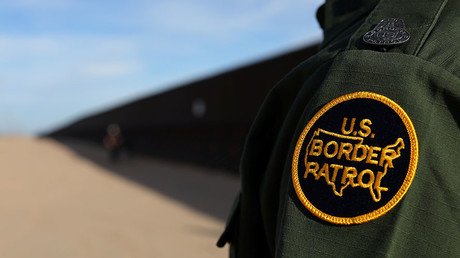Supreme Court declines to hear case of illegal immigrants denied asylum

The Supreme Court won’t wade into the debate over illegal immigration, declining to hear an appeal from a group of women and children from Central America who are seeking asylum. The case sought to clarify the rights of those prioritized for deportation.
The rejection leaves in place the ruling from a lower court that the families don’t have the right to contest their deportations in federal court.
The case, Castro v. Department of Homeland Security (DHS), centered around 28 women and 33 children ‒ ages 2 to 17 ‒ from El Salvador, Honduras and Guatemala who said they suffered “gender-based violence, including sexual assault, by men from whom they could not escape” or were targeted by gangs because “they are single women residing without a male household member to protect them” in their home countries.
The families were all apprehended in Texas within hours of illegally crossing into the US from Mexico in late 2015. They all sought asylum, which requires being in the US already, but immigration judges determined that the families lacked “credible fear” of persecution if returned to their home countries and placed them in expedited removal proceedings. They were detained at the Berks County Residential Center in Leesport, Pennsylvania.
The women, led by plaintiff Rosa Castro, challenged the rejection of their asylum claims in federal court, claiming their right to due process under the US Constitution was violated. Castro fled El Salvador with her six-year-old son, telling authorities she suffered years of rape, beatings and emotional abuse from her son’s father.
In August, the US 3rd Circuit Court of Appeals in Philadelphia, Pennsylvania ruled that the plaintiffs are not entitled to judicial review of their claims challenging their removal.
“Petitioners are attempting to create ambiguity where not exists,” Chief Judge D. Brooks Smith wrote in the 82-page decision, siding with “the majority of courts that have addressed the scope of judicial review… in the expedited removal context.”
“We are sympathetic to the plight of Petitioners and other aliens who have come to this country seeking protection and repose from dangers that they sincerely believe their own governments are unable or unwilling to address,” he concluded. “Nevertheless, Congress has unambiguously limited the scope of judicial review, and in so doing has foreclosed review of Petitioners’ claims.”
In light of this, he continued, “we cannot say that this limited scope of review is unconstitutional under the Suspension Clause, at least as to Petitioners and other aliens similarly situated.”
The 3rd Circuit’s ruling treated the families as equal to those who had arrived at the US border but had not yet entered.
Overstayers, not #border crossers greatest driver of #illegal US migrants https://t.co/53KQSC9Uu5pic.twitter.com/E5jw7gAVKw
— RT America (@RT_America) April 13, 2017
Human rights groups decried the Supreme Court’s decision not to hear the case.
“These families cannot be sent back to certain danger. The United States has an international obligation to grant asylum seekers a fair hearing. They must not be deported, or detained any longer, and must have their full cases heard by an immigration judge,” Margaret Huang, executive director of Amnesty International USA, said in a statement. “Families fleeing danger who pose no threat to anyone else should not be treated like criminals. They deserve justice.”
Human Rights First “expressed serious concern” that the Supreme Court left in place a “flawed ruling against asylum seekers.”
Before the Supreme Court declined to take the case, Acting US Solicitor General Jeffrey Wall filed a brief saying that the 3rd Circuit had gotten the ruling right.
“The court simply held that such aliens may not invoke the Constitution to demand procedural steps or measures regarding their applications for admission beyond those provided by existing statutes and regulations,” he wrote.
'This is new era, the Trump era': AG Sessions reveals enforcement plan at US-Mexico border https://t.co/viqlSXAT3Wpic.twitter.com/076M1qFPy8
— RT America (@RT_America) April 12, 2017
Since December, there has been a 93 percent drop in the number of parents and children caught trying to illegally cross the US-Mexican border, which US officials have attributed to President Donald Trump’s tough immigration policies, including increased raids and faster deportations. DHS is also considering separating parents and children captured at the border. Currently, families like those in Castro v. DHS are detained together.
The case was distributed to the Supreme Court justices for conference at the end of March. As such, Justice Neil Gorsuch, who was sworn in last Monday, “took no part in the consideration or decision of this petition,” the Supreme Court said.













